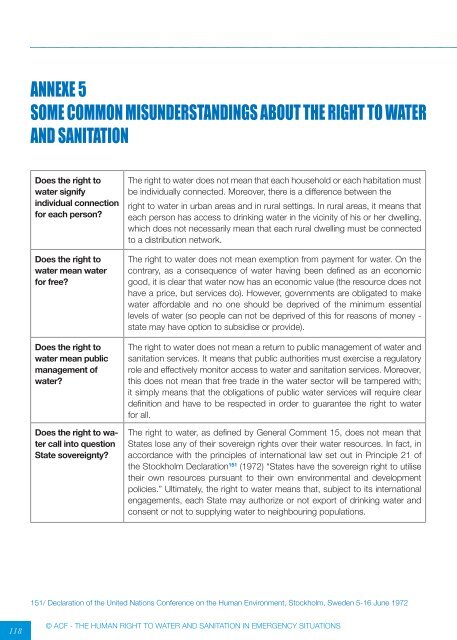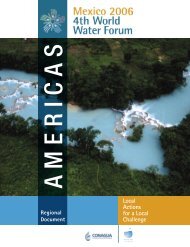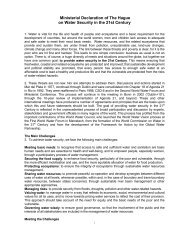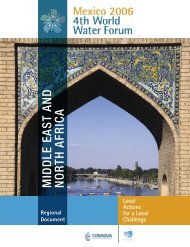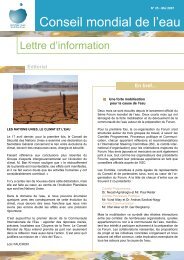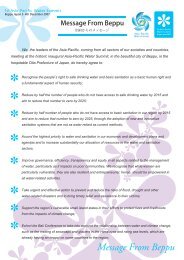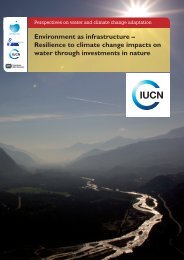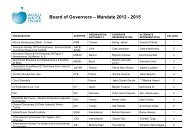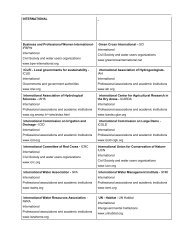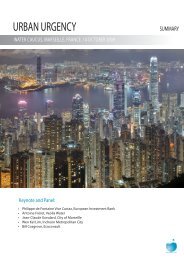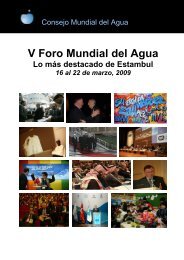the human right to water and sanitation in emergency situations
the human right to water and sanitation in emergency situations
the human right to water and sanitation in emergency situations
You also want an ePaper? Increase the reach of your titles
YUMPU automatically turns print PDFs into web optimized ePapers that Google loves.
118<br />
ANNExE 5<br />
SOME COMMON MISUNDERSTANDINGS AbOUT THE RIGHT TO WATER<br />
AND SANITATION<br />
Does <strong>the</strong> <strong>right</strong> <strong>to</strong><br />
<strong>water</strong> signify<br />
<strong>in</strong>dividual connection<br />
for each person?<br />
Does <strong>the</strong> <strong>right</strong> <strong>to</strong><br />
<strong>water</strong> mean <strong>water</strong><br />
for free?<br />
Does <strong>the</strong> <strong>right</strong> <strong>to</strong><br />
<strong>water</strong> mean public<br />
management of<br />
<strong>water</strong>?<br />
Does <strong>the</strong> <strong>right</strong> <strong>to</strong> <strong>water</strong><br />
call <strong>in</strong><strong>to</strong> question<br />
State sovereignty?<br />
The <strong>right</strong> <strong>to</strong> <strong>water</strong> does not mean that each household or each habitation must<br />
be <strong>in</strong>dividually connected. Moreover, <strong>the</strong>re is a difference between <strong>the</strong><br />
<strong>right</strong> <strong>to</strong> <strong>water</strong> <strong>in</strong> urban areas <strong>and</strong> <strong>in</strong> rural sett<strong>in</strong>gs. In rural areas, it means that<br />
each person has access <strong>to</strong> dr<strong>in</strong>k<strong>in</strong>g <strong>water</strong> <strong>in</strong> <strong>the</strong> vic<strong>in</strong>ity of his or her dwell<strong>in</strong>g,<br />
which does not necessarily mean that each rural dwell<strong>in</strong>g must be connected<br />
<strong>to</strong> a distribution network.<br />
The <strong>right</strong> <strong>to</strong> <strong>water</strong> does not mean exemption from payment for <strong>water</strong>. On <strong>the</strong><br />
contrary, as a consequence of <strong>water</strong> hav<strong>in</strong>g been def<strong>in</strong>ed as an economic<br />
good, it is clear that <strong>water</strong> now has an economic value (<strong>the</strong> resource does not<br />
have a price, but services do). However, governments are obligated <strong>to</strong> make<br />
<strong>water</strong> affordable <strong>and</strong> no one should be deprived of <strong>the</strong> m<strong>in</strong>imum essential<br />
levels of <strong>water</strong> (so people can not be deprived of this for reasons of money -<br />
state may have option <strong>to</strong> subsidise or provide).<br />
The <strong>right</strong> <strong>to</strong> <strong>water</strong> does not mean a return <strong>to</strong> public management of <strong>water</strong> <strong>and</strong><br />
<strong>sanitation</strong> services. It means that public authorities must exercise a regula<strong>to</strong>ry<br />
role <strong>and</strong> effectively moni<strong>to</strong>r access <strong>to</strong> <strong>water</strong> <strong>and</strong> <strong>sanitation</strong> services. Moreover,<br />
this does not mean that free trade <strong>in</strong> <strong>the</strong> <strong>water</strong> sec<strong>to</strong>r will be tampered with;<br />
it simply means that <strong>the</strong> obligations of public <strong>water</strong> services will require clear<br />
def<strong>in</strong>ition <strong>and</strong> have <strong>to</strong> be respected <strong>in</strong> order <strong>to</strong> guarantee <strong>the</strong> <strong>right</strong> <strong>to</strong> <strong>water</strong><br />
for all.<br />
The <strong>right</strong> <strong>to</strong> <strong>water</strong>, as def<strong>in</strong>ed by General Comment 15, does not mean that<br />
States lose any of <strong>the</strong>ir sovereign <strong>right</strong>s over <strong>the</strong>ir <strong>water</strong> resources. In fact, <strong>in</strong><br />
accordance with <strong>the</strong> pr<strong>in</strong>ciples of <strong>in</strong>ternational law set out <strong>in</strong> Pr<strong>in</strong>ciple 21 of<br />
<strong>the</strong> S<strong>to</strong>ckholm Declaration 151 (1972) “States have <strong>the</strong> sovereign <strong>right</strong> <strong>to</strong> utilise<br />
<strong>the</strong>ir own resources pursuant <strong>to</strong> <strong>the</strong>ir own environmental <strong>and</strong> development<br />
policies.” Ultimately, <strong>the</strong> <strong>right</strong> <strong>to</strong> <strong>water</strong> means that, subject <strong>to</strong> its <strong>in</strong>ternational<br />
engagements, each State may authorize or not export of dr<strong>in</strong>k<strong>in</strong>g <strong>water</strong> <strong>and</strong><br />
consent or not <strong>to</strong> supply<strong>in</strong>g <strong>water</strong> <strong>to</strong> neighbour<strong>in</strong>g populations.<br />
151/ Declaration of <strong>the</strong> United Nations Conference on <strong>the</strong> Human Environment, S<strong>to</strong>ckholm, Sweden 5-16 June 1972<br />
© ACF - THE HUMAN RIGHT TO WATER AND SANITATION IN EMERGENCY SITUATIONS


